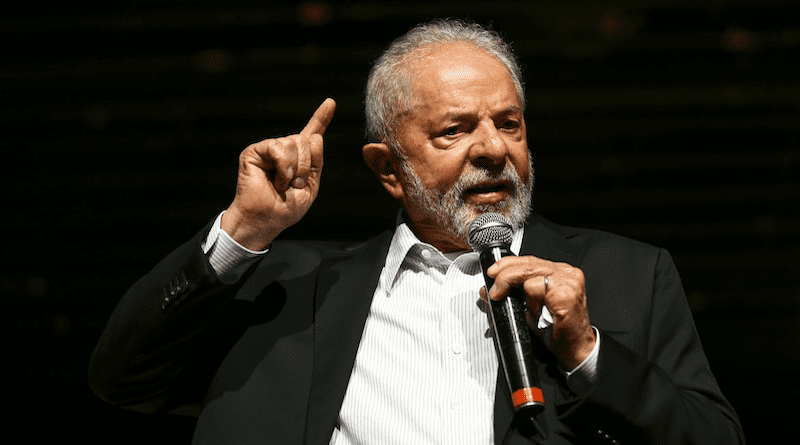Brazil’s Lula Warns If Europe Doesn’t Invest, Others Will
By EurActiv
By Aurélie Pugnet
(EurActiv) — Brazil’s President Luiz Inacio Lula da Silva on Wednesday (19 July) criticised the EU’s push to rework the Mercosur trade agreement as imposing double standards but remains optimistic that a deal could be sealed before the end of the year.
His comments came a day after the leaders of 33 Community of Latin American and Caribbean States (CELAC) met with their EU counterparts for a joint summit.
“If Europe doesn’t want to make investments, other countries do want to make investments,” Lula da Silva told a group of reporters, including EURACTIV, in Brussels.
“In the era of competition, countries need to understand its important to benefit from Latin America,” Lula da Silva said, a veiled reference to being open towards more Chinese investments in the country.
The EU has launched Global Gateway, a €300 billion scheme that offers developing countries an alternative to China’s Belt and Road Initiative (BRI) through a series of worldwide infrastructure developments.
But the EU’s investment in Brazil does not match the population’s current needs and is not defined in cooperation with the authorities, the country’s envoy to the EU told EURACTIV earlier this week.
Lula said the reason for Europe’s renewed interest in investing in South America is unclear.
“Political and economic interest in Latin America has been so great in the countries of the European Union, possibly because of the dispute between the United States and China, by China’s investment in Latin America, possibly [because of] the new leftist route, or simply by the civil war in Ukraine.”
Lula da Silva said his country could play a role as an energy provider as “the parts of the world [that want] the green hydrogen needs South America” and to produce medicines whose shortage was a major issue during the COVID-19 pandemic.
Counterproposal soon
The EU and the Mercosur bloc completed trade negotiations in 2019, but the deal has been on hold due to concerns about Amazon deforestation and Brazil’s commitment to climate change action.
Lula, elected last year, promised to overhaul his country’s climate policy.
Brazil’s leader also criticised the EU’s addendum to the EU-Mercosur agreement it sent its partners in the spring, highlighting that clashes over agriculture and sustainability persist.
The European Commission had proposed attaching an annexe to the agreement to show commitments to deforestation and other areas of sustainability and is awaiting Mercosur’s response.
“Europe wrote an aggressive letter to threaten [Mercosur] with sanctions and punishments if it did not fulfil certain environmental requirements,” Lula said.
“I said to the EU: two strategic partners do not discuss through threats, but through proposals,” he added.
He said Brazil’s response is currently being discussed with the other Mercosur countries, which will send the EU answer in two to three weeks, adding he believed the EU would “very easily” agree with it.
“The problems and difficulties are not only due to Latin America,” Brazil’s president told reporters, taking a swipe at France for the protection of its national industry. He said France has its own policies to defend agricultural assets, and Brazil should do the same.
“France has policies to defend its agriculture assets, we also want to defend our agriculture power and wealth,” he said.
In an attempt to answer the European’s worry about the future deforestation of the Amazon and calls for a binding agreement, Lula recalled he took a vow to protect it.
“We have a commitment that is not an agreement between the parties, but a historic one from my last campaign, [taken]at the COP in 2025: zero deforestation until 2030. It’s a commitment to us, Brazilians, not to the EU, to Brazilians,” Lula said.
“Few people in the world who can talk about issues such as clean energy, preservation like us,” he said.
Government procurement
“We won’t make concessions on government procurement,” But Lula warned that there would be no concessions on government procurement, and he would seek to protect them as a tool for sovereign policy.
He stated that if government procurement is important for European countries, it should also be important to Brazil, adding, “This is an important instrument that no country can give up. Why would a country that is the size of Brazil…kill our small and medium-sized enterprises, kill the possibility of new entrepreneurs emerging?”
Half-agreement on the cards
Lula nevertheless showed optimism in concluding the Mercosur agreement soon.
“I am optimistic that we will finalise the agreement later this year, under the Spanish presidency” of the Council of the EU, ending in December, he said.
Brazil’s leader also left the door open to dividing the agreement into two parts to move forward on the agreed principles.
“If the agreement is not possible on one item, then we [can] make an agreement on the other issues,” Lula said. “Large amounts of the agreement are at stake.”

